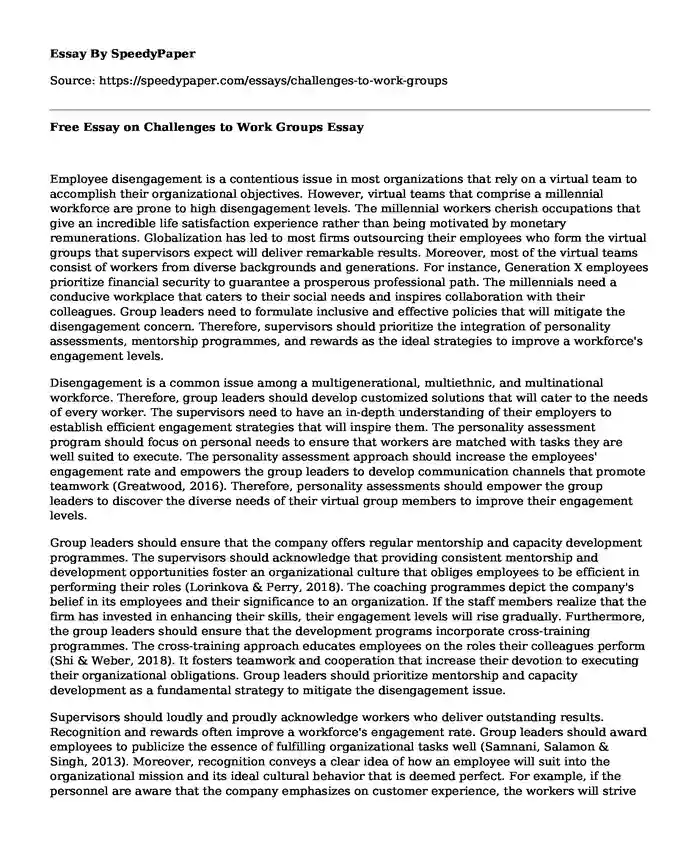
| Type of paper: | Research paper |
| Categories: | Human resources Multiculturalism Business management Leadership style |
| Pages: | 3 |
| Wordcount: | 723 words |
Employee disengagement is a contentious issue in most organizations that rely on a virtual team to accomplish their organizational objectives. However, virtual teams that comprise a millennial workforce are prone to high disengagement levels. The millennial workers cherish occupations that give an incredible life satisfaction experience rather than being motivated by monetary remunerations. Globalization has led to most firms outsourcing their employees who form the virtual groups that supervisors expect will deliver remarkable results. Moreover, most of the virtual teams consist of workers from diverse backgrounds and generations. For instance, Generation X employees prioritize financial security to guarantee a prosperous professional path. The millennials need a conducive workplace that caters to their social needs and inspires collaboration with their colleagues. Group leaders need to formulate inclusive and effective policies that will mitigate the disengagement concern. Therefore, supervisors should prioritize the integration of personality assessments, mentorship programmes, and rewards as the ideal strategies to improve a workforce's engagement levels.
Disengagement is a common issue among a multigenerational, multiethnic, and multinational workforce. Therefore, group leaders should develop customized solutions that will cater to the needs of every worker. The supervisors need to have an in-depth understanding of their employers to establish efficient engagement strategies that will inspire them. The personality assessment program should focus on personal needs to ensure that workers are matched with tasks they are well suited to execute. The personality assessment approach should increase the employees' engagement rate and empowers the group leaders to develop communication channels that promote teamwork (Greatwood, 2016). Therefore, personality assessments should empower the group leaders to discover the diverse needs of their virtual group members to improve their engagement levels.
Group leaders should ensure that the company offers regular mentorship and capacity development programmes. The supervisors should acknowledge that providing consistent mentorship and development opportunities foster an organizational culture that obliges employees to be efficient in performing their roles (Lorinkova & Perry, 2018). The coaching programmes depict the company's belief in its employees and their significance to an organization. If the staff members realize that the firm has invested in enhancing their skills, their engagement levels will rise gradually. Furthermore, the group leaders should ensure that the development programs incorporate cross-training programmes. The cross-training approach educates employees on the roles their colleagues perform (Shi & Weber, 2018). It fosters teamwork and cooperation that increase their devotion to executing their organizational obligations. Group leaders should prioritize mentorship and capacity development as a fundamental strategy to mitigate the disengagement issue.
Supervisors should loudly and proudly acknowledge workers who deliver outstanding results. Recognition and rewards often improve a workforce's engagement rate. Group leaders should award employees to publicize the essence of fulfilling organizational tasks well (Samnani, Salamon & Singh, 2013). Moreover, recognition conveys a clear idea of how an employee will suit into the organizational mission and its ideal cultural behavior that is deemed perfect. For example, if the personnel are aware that the company emphasizes on customer experience, the workers will strive to produce excellent products or services to be recognized. Hence, virtual employees should be conversant with the company's reward and appreciation policies to improve their occupational commitment to producing world-class products and services.
Disengagement is a contentious issue among a multinational, multiethnic, and multinational workforce. Group leaders should incorporate appreciation policies, mentorship programmes, and personality assessments as the most effective strategies to minimize disengagement. The personality assessments enable the supervisors to design policies that cater to the employees' diverse needs. Additionally, group leaders should recognize that mentorship is a fundamental factor that enhances the engagement levels among the staff members. Ultimately, recognition and rewards should be used to inspire employees to improve their engagement levels and comply with the organizational vision and culture.
References
Greatwood, M. (2016). How to counter the growing disengagement with engagement programs. Development and Learning in Organizations: An International Journal, 30(2), 15-17. doi: 10.1108/dlo-12-2015-0097
Lorinkova, N., & Perry, S. (2018). The importance of group-focused transformational leadership and felt obligation for helping and group performance. Journal of Organizational Behavior, 40(3), 231-247. doi: 10.1002/job.2322
Samnani, A., Salamon, S., & Singh, P. (2013). Negative affect and counterproductive workplace behavior: The moderating role of moral disengagement and gender. Journal of Business Ethics, 119(2), 235-244. doi: 10.1007/s10551-013-1635-0
Shi, W., & Weber, M. (2018). Rethinking the complexity of virtual work and knowledge sharing. Journal of the Association for Information Science and Technology, 69(11), 1318-1329. doi: 10.1002/asi.24055
Cite this page
Free Essay on Challenges to Work Groups. (2023, Jan 11). Retrieved from https://speedypaper.com/essays/challenges-to-work-groups
Request Removal
If you are the original author of this essay and no longer wish to have it published on the SpeedyPaper website, please click below to request its removal:
- What Really Matters? Free Essay on Volunteering
- Free Essay Sample on the U.S. Intelligence
- Nursing Essay Sample: Transitional Nursing and PTSD
- Free Essay about the Technological Advancements and the Job Market
- Introduction of Law Enforcement Officer Use of Excessive Force
- Free Sample on Determining EEO And Affirmative Action Compliance
- Free Essay Example - Human Experience of Illness
Popular categories




